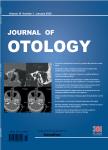Age predicts the absence of caloric-induced vertigo
Age predicts the absence of caloric-induced vertigo作者机构:Department of Hearing and Speech Sciences Divisions of Audiology and Vestibular Sciences Vanderbilt University Medical Center Nashville TN USA Department of Communication Sciences and Disorders James Madison University Harrisonburg VA USA
出 版 物:《Journal of Otology》 (中华耳科学杂志(英文版))
年 卷 期:2018年第13卷第1期
页 面:5-9页
核心收录:
学科分类:1003[医学-口腔医学] 1002[医学-临床医学] 100213[医学-耳鼻咽喉科学] 10[医学]
基 金:from funding agencies in the public commercial or not-for-profit sectors
主 题:Vestibular Vertigo Central processing Caloric test Aging
摘 要:Introduction: The absence of vertigo during the caloric test, despite a robust response, has been suggested to represent a central vestibular system phenomenon. The purpose of this investigation was to determine the prevalence of absent caloric-induced vertigo perception in an unselected group of patients and to assess possible predicting variables.Methods: Prospective investigation of 92 unselected patients who underwent caloric testing. Inclusion criteria were that each patient generate a maximum slow phase velocity(maxSPV) 15 deg/sec and a caloric asymmetry of≤10%. Following the caloric, patients were asked, Did you have any sensation of motion?Results: Results showed 75% of patients reported motion with a mean age of 56.51 years compared to a mean age of 66.55 in the 25% of patients reporting an absence of motion. A logistic regression was performed and the overall model was statistically significant accounting for 29% of the variance in caloric perception. The significant predictor variables were patient age and maxSPV of the caloric response. The effect size for both variables was small with an odds ratio of.9 for maxSPV and 1.06 for age.Conclusions: The current investigation showed that both age and maxSPV of the caloric response were significant predictors of vertigo perception during the caloric exam. However, the association between age and caloric perception is not conclusive. Although there is evidence to suggest that these findings represent age-related changes in the central processing of vestibular system stimulation, there are additional unmeasured factors that influence the perception of caloric-induced vertigo.



